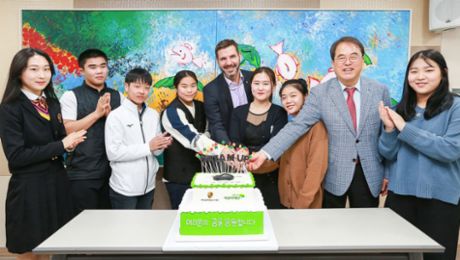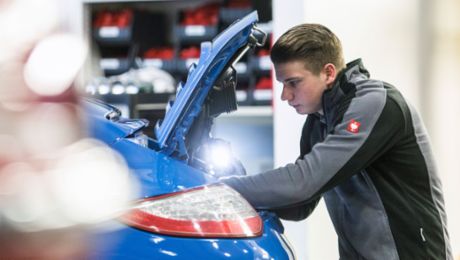Lena Rüffer
Many dream of a career as a professional tennis player. Yet the path to the major stadiums is far from easy. Lena Rüffer (20) from the Porsche Talent Team has embarked on this journey – with a clear goal in mind and high hopes in her heart.
A small tennis ball magnet with a Wimbledon logo – for many a nice souvenir of the Grand Slam tournament – is a treasured belonging with very special significance for Lena Rüffer. A trip without the good-luck charm? Unthinkable. She has carried the talisman with her ever since receiving it as a gift from her parents, nestled in a small red pouch so that her Wimbledon dream is always close at hand. “I look at it and think to myself: this is my goal. I want to play there,” she explains with a grin.
The 20-year old is living the dream of becoming a professional tennis player. The up-and-coming Porsche Talent Team player is pursuing her path with determination, purpose and discipline. Advancing to the quarter-final of the ITF tournament in Hechingen, the semi-final of the ITF tournament in Essen and the second round of qualification in the Porsche Tennis Grand Prix in 2018 saw her climb to number 324 in the WTA ranking (February 2019). The Berlin-born player trains daily in the German Tennis Federation's Stuttgart-Stammheim training centre, travels from tournament to tournament and sacrifices many things that are common for most people her age. While her peers head out at night, she needs to recuperate. This lifestyle takes guts, but more than anything else huge enthusiasm for the sport. Lena has both. And she doesn’t miss anything: “Tennis is my life and that’s fine by me.”
Lena’s dream of a professional career started as a child in her kids’ tennis club – and has not wavered to this day. “Tennis is my passion. It made complete sense to me to want to give it a go,” she says determinedly. Reconciling school, training and tournaments, however, was not always easy. Lena looks back: “Tennis and school – that’s all there was.” To ensure the best possible educational and athletic development, after Year 10 she switched to the Poelchau School, an elite sports school in Berlin. Since her secondary school leaving examination in 2017, the only thing that has mattered for her is sport: “Now I can focus entirely on one thing.”
Lena believes in herself. She has never had a moment of doubt. She always has her own goals in sight – and doesn’t allow herself to be distracted. There is no particular player she looks up to, on the contrary it’s the tournaments in the major stadiums that time and again give her a big motivational boost. In a few years she “would very definitely like to be playing in all the Grand Slams.” Her aim for 2019 is to improve her WTA ranking and qualify for a Grand Slam tournament.
The US Open is one such tournament. Another of Lena’s treasured belongings is a hand towel from the tournament, a souvenir from her friend Anna Zaja: “She brought it back for me from her first US Open in 2017. The fact that she has come so far is very motivating to me.” Whenever the two players are at the same tournament, they spend every spare moment among friends catching up, including off the court. Competitors during the day and friends at night? Not a problem for Lena: “Tennis is an individual sport. On the court everyone wants to win – but that doesn’t rule out friendships.”
There is no shortage of fun either within the team during the daily training sessions at the German Tennis Federation's training centre. Breaks are spent talking, eating, laughing and – very importantly – playing far too much Yahtzee. This makes the downtime until the next match fly by.
Lena’s daily routine is ruled by training and tournaments: her alarm clock goes off at 7 am. After breakfast she goes straight to the training centre in Stuttgart-Stammheim, where fitness and tennis training starts at 9 am. This is followed by a communal lunch at 1 pm and free time until 2.30 pm. In the afternoon it’s back to tennis and a second round of fitness training. When that’s done, Lena goes for physiotherapy. “By the time I’m finished with that it’s usually already 7 or 8 pm and I fall into bed,” she says with a smile.
That doesn’t leave much free time for family and friends. “Time is limited, but that’s OK,” she says. To “just wind down”, Lena plays piano in her free time, reads and meets up with friends. In her family, boyfriend and trainer team, the up-and-coming player has people around her who encourage her and show an understanding of her passion. Tennis arouses strong emotions in Lena. “It is important that those around me understand this emotionality,” she says.
The 20-year old knows exactly what she wants. She hasn’t set any time limits for her goals, but “there must be a clear upward trajectory”. Lena comes across as very self-reflective. If something isn’t going as she imagined, she works on it consistently. “You can see progress by the ranking. If I’m not improving, I’m not progressing,” she says self-assuredly.
Travelling is part of everyday life for an up-and-coming talent: Lena spends two to three weeks a month away from home. She finances these trips with funding provided by the Porsche Talent Team as well as herself through tournament earnings and the national league. But what do you take with you when travelling from tournament to tournament? Lena opens her suitcase for us and reveals what she can’t travel without.
It doesn’t take long for her to pick her number one – she goes straight to photos of her loved ones. No matter what hotel room she currently finds herself in, photos of her boyfriend and family make her feel like she’s at home. She also always has two books with her: “one for my brain and one for entertainment.” Another must: stencils, strings and string dye. In order for the sponsor’s logo to be clearly visible on the racket, the players have to keep redoing it themselves at tournaments. Also ever present in her suitcase are her laptop and speakers. Exciting series and good music are the best way for the up-and-coming player to properly relax after tennis. With an elegant handbag, she is also ideally equipped for going out in her free time. Another must-have in Lena’s luggage: good humour. Because the only way to make the leap to the professional career so many dream of is by really enjoying your sport.
Sami Khedira
Sami Khedira knows that “not all young people are as fortunate as I was”. That’s why he’s so involved in the up-and-coming players today. He himself spent his youth at the VfB Stuttgart football club. Here, the 2014 world champion remembers his first steps on the football pitch. Because even the Juventus Turin midfielder started off small. Very small, in fact…
Mr Khedira, do you still remember your first pair of football boots?
I think they were Adidas. Of course as a five year old you have no idea about brands. I’m certain about one thing: they were the hand-me-downs from a neighbour. And that was OK. The main thing was having boots; then all you needed was a ball and you could start playing.
Why didn’t you go straight to VfB from Oeffingen?
Back then I used to train at SV Fellbach. But even there I was too shy. So I went to the club TV Oeffingen. That’s where my friends were playing and the club was right on our doorstep, so it was very easy logistically.
And then you came to the attention of VfB at a tournament in Wernau?
Yes, the trainer for the E age group asked my father whether I would like to attend a trial training session. My father asked me. At seven, eight years of age, I already knew that VfB was something special. I took him up on the invitation.
Ex-national player Serdar Tasci, three weeks younger than you, was in the D age group when he came to VfB – and was thrown off balance when his friends were dropped at the end of the season. What did you think of this?
I’d already had that happen in the E age group. You have to think of it this way: I had switched from Oeffingen to VfB, and therefore had been uprooted from my surroundings. So I sought out new friends on the new team. And at the end of the season, suddenly two new friends were gone. For one, the distance to Stuttgart was just too far to keep doing. And the other one was dropped. When that happened I told my father: “If they’re not playing any more, then I’m not going either.”
What did you father do?
He talked me out of it.
It worked …
Yeah, along the way I learned about the performance principle and came to accept it. I wanted to stick with it, which may even have made me train more sometimes. So I don’t remember ever feeling pressure. We just wanted to play football.
And life in the Khedira household was shaped by the game …
Very much so, to the chagrin of my mother. She’s never really been a fan of football. My father, on the other hand, was even our team organiser at VfB from the D age group on. He fell into the job. He started out by cutting fruit for us, and handing out drinks to the team during half-time. Then he started doing more and more, all voluntarily. When I left the youth team, the club really wanted by father to carry on. But he refused. He preferred to watch my younger brother Rani’s and my games.
Bayern star player Javi Martinez recently said that in the future he’d like to become a youth trainer for 15 and 16 year olds. In other words for the age group when the decision is made about whether a player gives up or carries on. Did you ever have doubts?
No, never. On the contrary. At 15, 16, I gradually became aware of what I was doing. My trainer in the B age group had already told me that I could make it as a professional if I worked hard. And the nice thing about VfB is that you can see the stadium from the training pitch. I said to myself: I want to run out there some day. So I trained even more.
What do fellow pupils and teachers make of you when you’re a youth player for VfB?
After Year 8 I switched to a school that had a partnership with VfB. The aim was to have even more time for training. On top of that came courses and the sessions with the National Youth Team. I was absent a lot. In my last year of school, I had an absence rate of 50%. So of course the other pupils were jealous. What they forgot was that I still had to learn the material, in some cases with the help of private tutors. That wasn’t always easy.
Moving on to the fruits of your labour. Do you still remember your first professional training session?
I was still playing for the A age group, so the invitation was a surprise. After the professional players returned from the winter training camp, I luckily only had one night to think about it: training under Giovanni Trapattoni! It wasn’t a good night. But things went better at training.
And now you can look back on a long career spent in big clubs alongside stars like Ronaldo, Alonso, Buffon and Pogba. How do you handle that?
After I signed at Real, I realised that it was time for me to really prove myself, something not everyone thought I could do. On the way to the first training session, I suddenly found myself sitting with Kaka, Ramos and Ronaldo on the bus. That was funny. But they were the very players who come up to me and said: “Welcome, if you need anything let me know.” In my experience from both Madrid and Turin, the higher you climb in this game, the more relaxed the players.
Nevertheless, how much egotism do you need to come out on top in the professional arena. How much is allowed?
What you have are eleven individuals on the pitch, who know that they need to work as a team. For me that means that each one can indulge their egotism as long as it benefits the team. No one is allowed to hurt the team.
Your self-confidence has always appeared unshakeable. Is that something you just have to have to make it from the small boy with second-hand boots to world champion?
I’ve trained myself to be self-confident. You have to be able to manipulate yourself. It’s always a fine line from there to arrogance. For me, though, self-confidence doesn’t mean believing that I can do everything. On the contrary, it means being aware of your strengths and admitting your weaknesses, knowing exactly what you need to work on in order to improve. And knowing what you would be better avoiding. For example, not everyone can dribble like Ronaldo or Messi.
When you’re travelling these days for your foundation or as an ambassador for “Turbo for Talent” and meet sports-mad kids, do you see yourself in them?
I’ve been very fortunate, which is why I want to give back something to young people through my foundation and my involvement with Porsche. You can’t help but notice that times are changing. And that’s a good thing. What hasn’t changed is that there are quieter kids and cheekier ones. And that’s completely fine too. The crux of the matter is that sport teaches values: respect, politeness, discipline. They must be present. That goes for all sports, not just football. Without these values, it won’t work.
About Sami Khedira
Sami Khedira (32), son of a German mother and a Tunisian father, spent his youth and the initial years of his professional career at VfB Stuttgart. He is one of the most successful German footballers of his generation.
With VfB, Real Madrid and Juventus Turin, he has celebrated five national championships and five national cup wins so far. In 2014, he won the World Cup with Germany and the Champions League with Madrid.
He is the founder of the Sami Khedira Foundation for Disadvantaged Children and Young People and acts as an ambassador for the Porsche youth development programme “Turbo for Talent”.
In 2016, he received the Order of Merit of Baden-Württemberg. One of his national team jerseys is on display in the “Museum of National Cultures” in Berlin.
Info
Text: Carolin Schmitt, Reiner Schloz
Photos: Jean Catuffe/Getty Images, Alexander Scheuber/Getty Images, Stefan Hohloch, Federico Ciamei, Victor Jon Goico
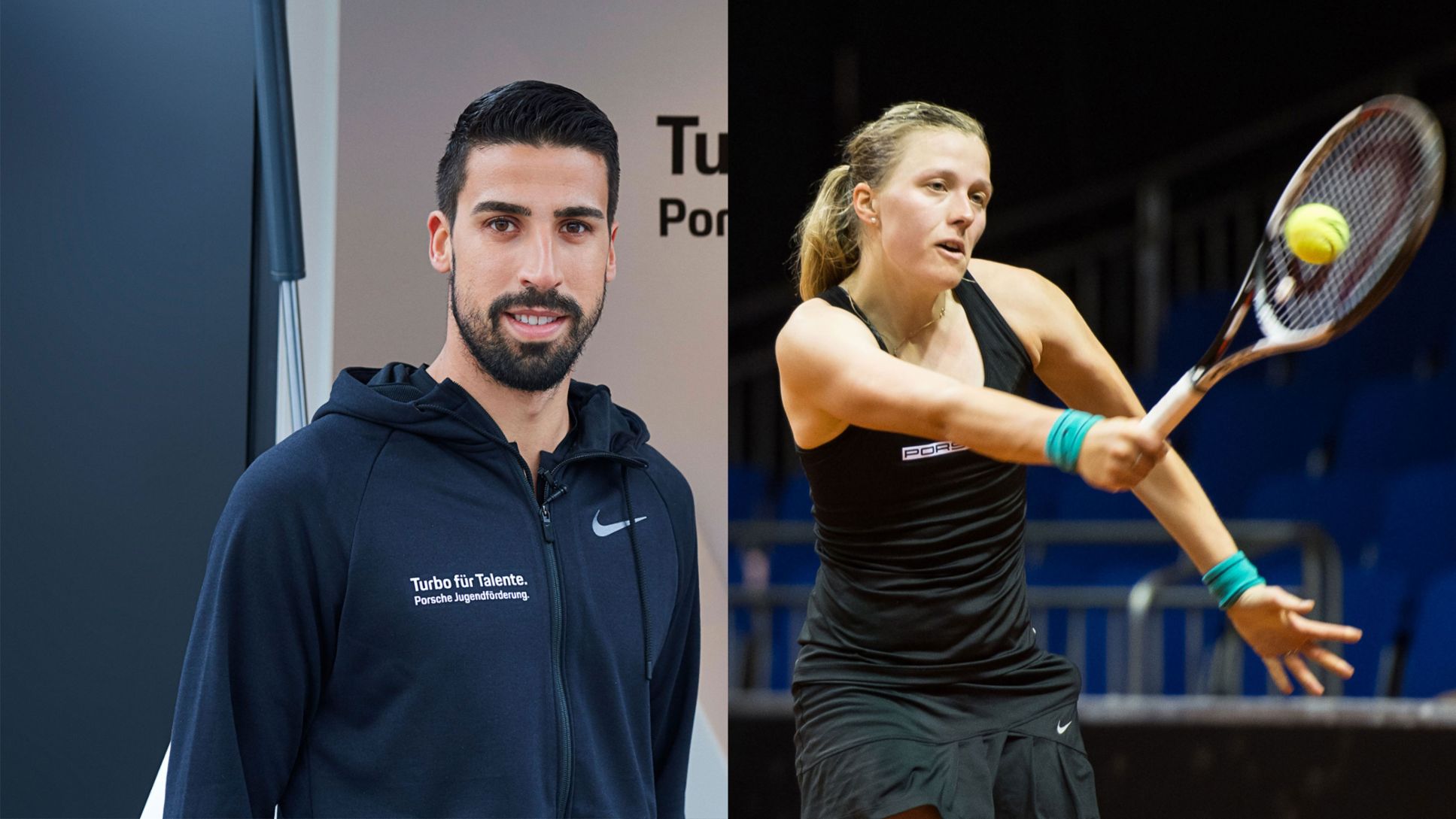
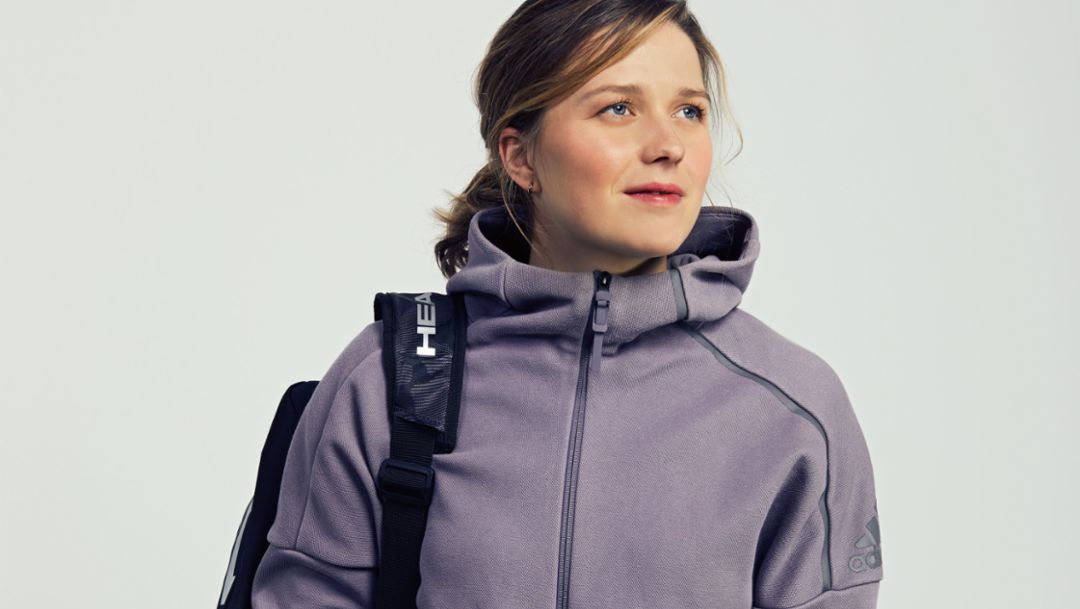
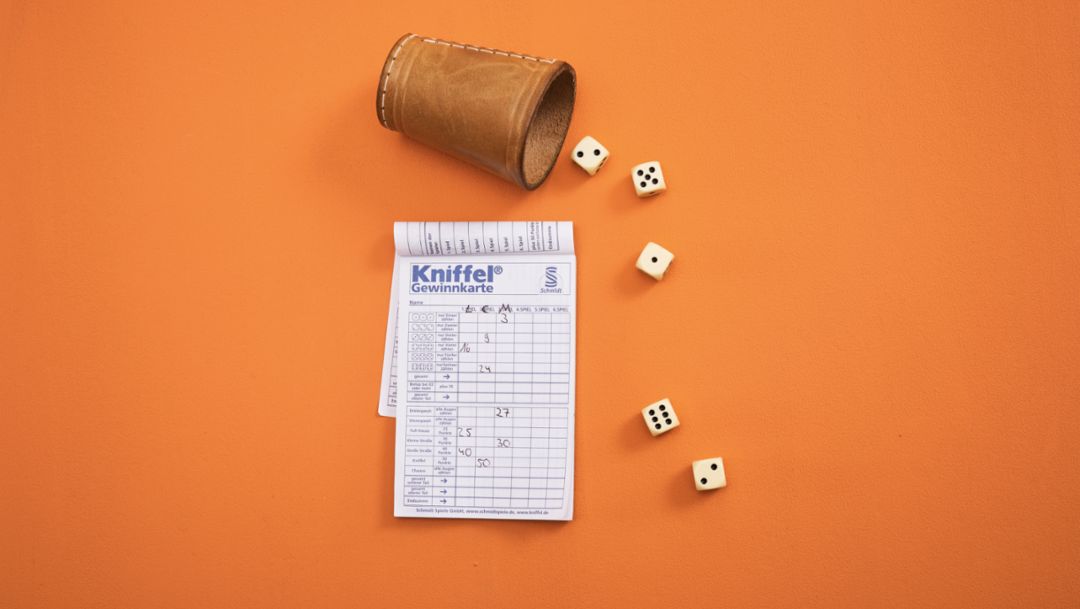
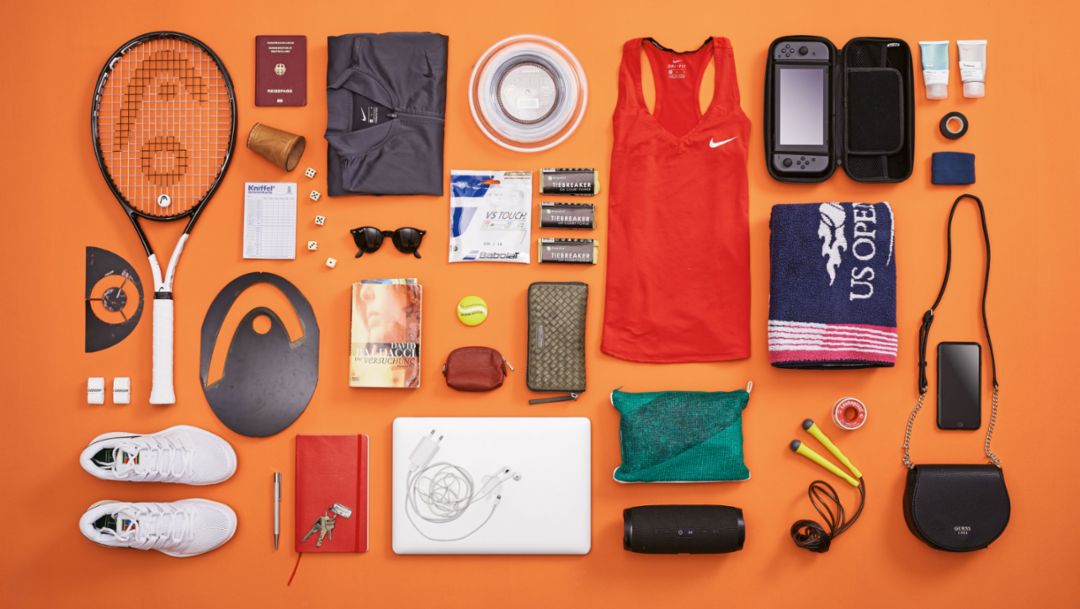
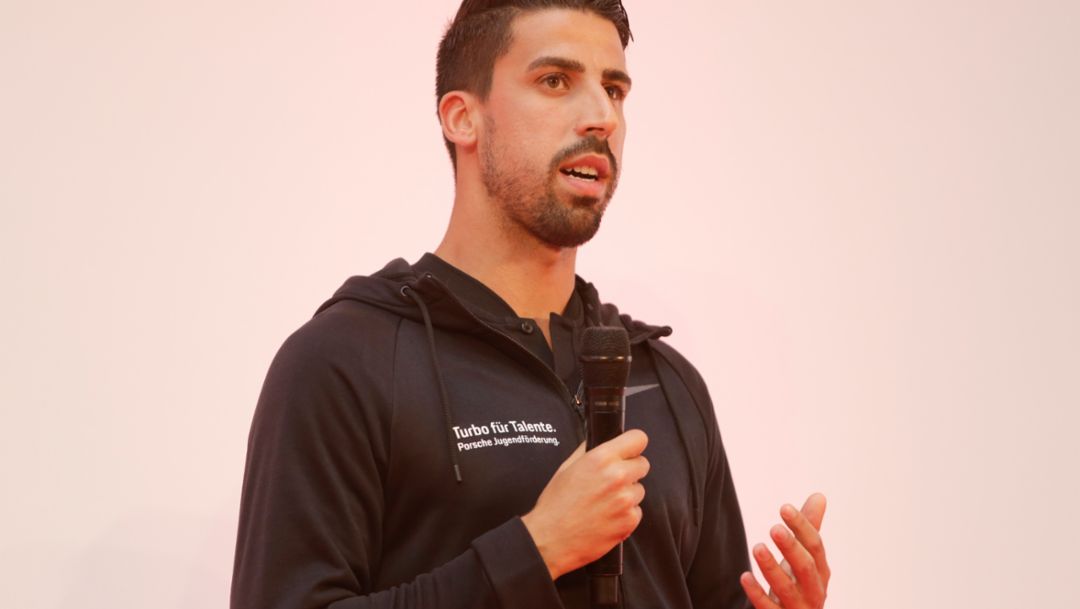
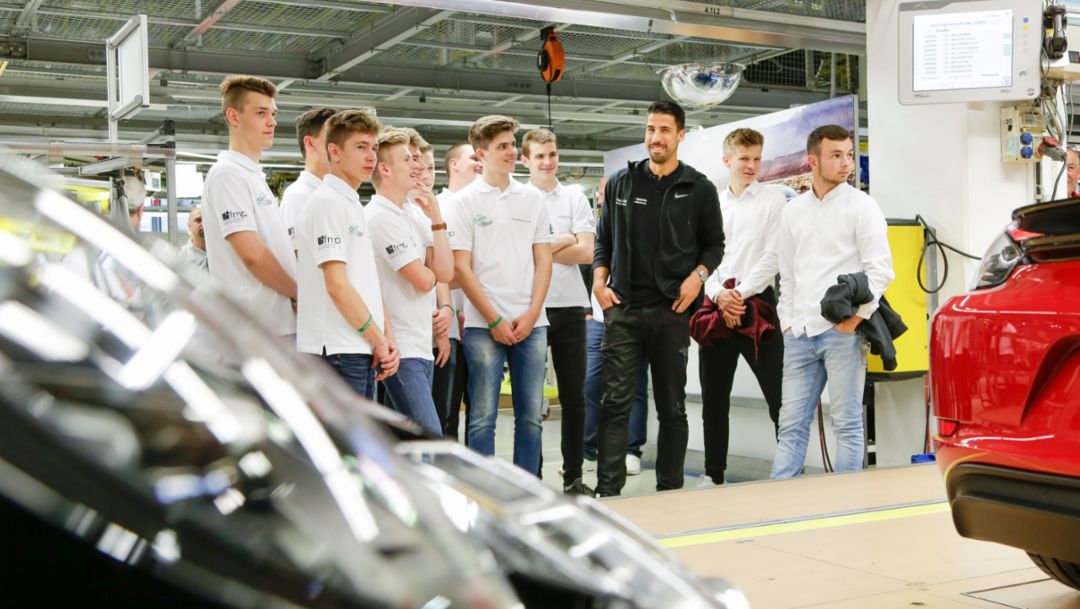
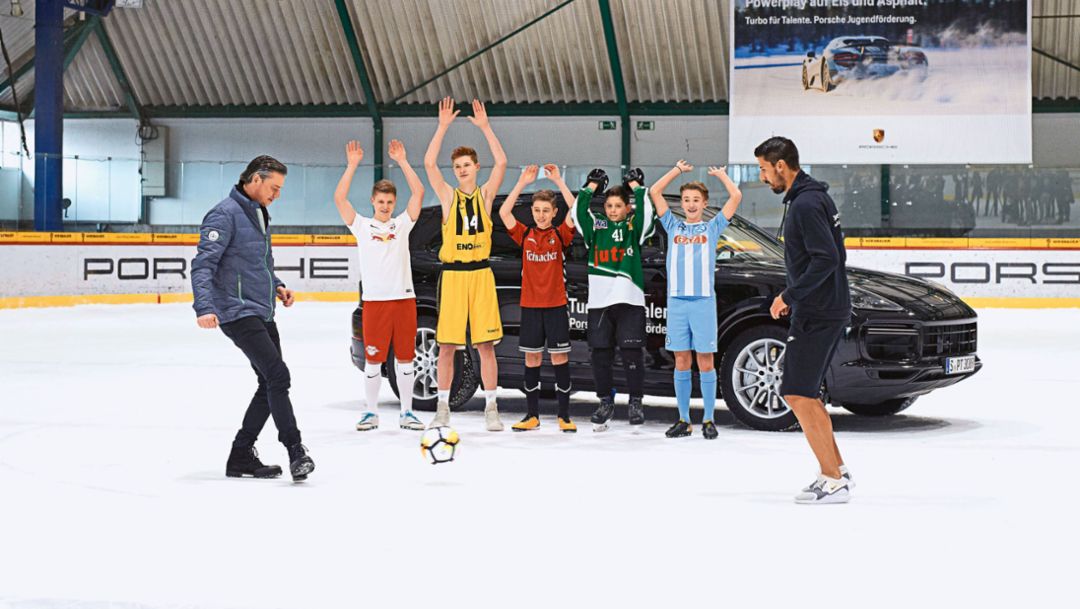
-2.jpg/jcr:content/b-_VJG9483%20(2)%202.jpg)
